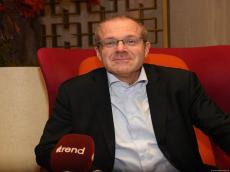Today.Az » Business » COP for Hope: Health is featured very high on the agenda of COP29 - WHO Regional Director Hans Kluge (Exclusive interview)
20 November 2024 [10:35] - Today.Az

BAKU, Azerbaijan, November 20. As part of COP29 in Baku, Azernews proudly presents COP for Hope, a special project offering an unparalleled platform to hear from world leaders and trailblazers in politics, economics, science, and ecology, all united by a shared commitment to addressing today’s pressing climate challenges. Today, we are honored to speak with Dr Hans Henri P. Kluge, World Health Organization's (WHO) Regional Director for Europe. In an exclusive interview with Azernews on the sidelines of COP29, Kluge said that the event is very well organized. “I just finished the bilateral meetings with the Minister of Health, Minister of Foreign Affairs and Prime Minister of Azerbaijan. And after two days being here, I really would like to start to congratulate the government of Azerbaijan, President Ilham Aliyev, because COP29 is amazing,” he said. Kluge noted that Azerbaijan only had nine months to prepare, while Brazil has two years to prepare for the COP30. “COP29 is very well organized. Obviously, as a medical doctor, I'm very glad that health is featured very high on the agenda. Actually, Azerbaijan's COP presidency is bringing together four other COP presidencies, UAE, Egypt, Brazil, and UK, to ensure that health will remain a priority in the global climate negotiations. So really, bravo,” added WHO’s regional director. Kluge believes that the world really must start seeing real commitments on reducing the carbon emissions at this COP. “Why the health sector is important? If you take the whole health sector, it contributes to 5 percent of the global emissions, double the emissions generated by all of the world's aircraft. Health sector can be a big polluter, but can, to take it positive, contribute a lot to the green economy. We really must try to keep warming below 1.5 degrees Celsius, because all areas of health are impacted. Now in Italy, for example, we see tropical diseases which they haven't seen for a very long time, like West Nile virus. Spain is completely not prepared for the flooding. More than 200 people died and still people are struggling. The impact of climate change is not going to go away. We have to tackle it heads on. And again, congratulations that Azerbaijan, based on my discussions with the leadership, is taking the COP29 itself as a transformative moment to move towards a green economy. Minister of Health Teymur Musayev told me that all hospitals will be greened in five years. Congratulations,” said WHO’s regional director. He went on to add that all areas of health are impacted by the climate change. “But I would like to focus on just one, which I also picked up at COP29, the mental health, particularly mental health of the youth. There is a new term called eco-anxiety, anxiety among the youth. They see the future not so positive really, with less hope than before. Youth can be depressed, there is climate fatigue. We also know from our studies that a 1-degree Celsius increase in temperature is directly linked to 1 percent increase in suicides among the youth. It really shows that climate change and health are directly intertwined. Data from Australia shows that heat waves have been linked to increases in both mental and behavioral disorders. In that sense we need to get a deeper insight. For example, healthcare workers dealing at the front line of climate crisis need also to be educated about the mental health aspects. And here WHO will start a lot of research in this particular area,” said Kluge. He pointed out that what the WHO found out from the research is that a big polluter is the transport between healthcare facilities. “There are a number of projects which introduce telehealth digital health, drones to deliver medicines, which can help with greening of the economy, also ensure much better waste management. We have guidelines on all of those. In addition, digital health tools, including the use of artificial intelligence, will help to reduce the carbon emissions,” said WHO’s regional director. Kluge mentioned some concrete initiatives in this regard. “Number one, we have a WHO European Centre on Environment and Health in Bonn in Germany, which produced global guidelines for heat health action plans, because the number one cause of mortality due to climate change in our region is heat. 174,000 people die every year due to heat. Last year was the hottest summer record in history, and it's only going to increase. Heat health action plans are very important. Number two, on February 27, I'm going to launch in Reykjavik, Iceland, with the previous Prime Minister of Iceland, Katrin Jakobsdóttir, a new Pan-European Commission on Climate Change and Health to elevate the health sector leadership in this regard. I asked Azerbaijan’s prime minister and health minister to appoint a commissioner from Azerbaijan. There are only 11 high-level political commissioners, because we need to make the link between COP29 and COP30, and Azerbaijan has a lot to show,” he said. WHO’s regional director pointed out that he was fascinated by the concept of smart villages, both digital and green. “This is very avant-garde”. Kluge went on to add that WHO has a process of health and environment, which is unique in WHO globally. “Every five years we organize a Ministerial Conference on Environment and Health. The last one was last year in Budapest, Hungary, where we agreed with all 53 member states on concrete actions to address what we call the triple crisis, climate change, loss of biodiversity and environmental pollution,” he concluded.
|